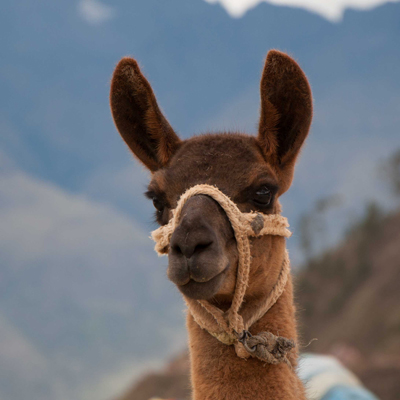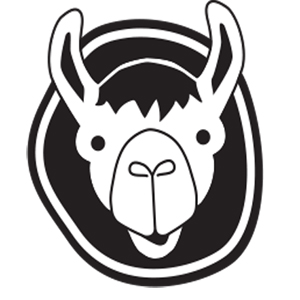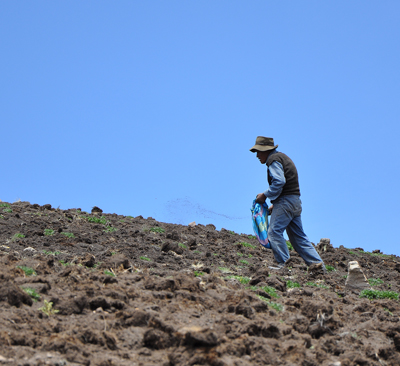
“Let food be your medicine and medicine be your food“
Quote from Hippocrates, famous doctor of antiquity
We want to do good by contributing to healthy nutrition, giving the producers in the originating countries a fair livelihood, and making it possible for children in developing countries to have a brighter future.
To reach this goal we operate according to three principles:
WE BUY DIRECT
Direct purchase from producers in Peru:
Careful selection of Peruvian producers:
- We select our producers locally in Peru
- We work exclusively with producers that are audited according to European standards and are certified organic
We look for sustainable growing practices that are in harmony with preserving nature
- Careful use of natural resources is very important to us
- Monocultures and cutting down the rain forest are not acceptable to us
- We regularly visit the production and growing areas to ensure the adherence to these standards
We ensure a gentle processing of raw materials, in order to preserve all valuable ingredients
- We ensure processing according to the principles of Raw Food philosophy
- Our products are 100% natural, without any additives
We buy our goods from controlled organic farming or wild crop collection
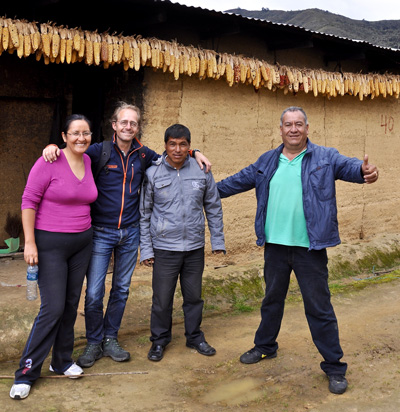
WE HELP
We enable poor children near Cusco to attend kindergarten and school:
We believe that education is the best way out of poverty and into a better future. This is why we make it possible for poor children to have access to education.
With each package sold we collect and donate a portion of the profit to children in need in Peru.
We take over sponsorships for poor children in Cusco region and enable them to visit kindergarten and school classes
- We take over sponsorships for 3 years in the village of Andahuaylillas, which is approximately 1 hour from Cusco in the Valle Sagrado (holy valley).
- As we are just starting our operations, we have begun our sponsorships in March of 2016. With increasing business success, we will continue to sponsor more children. We will continuously report about the development of our sponsorships in our blog.
- In this case we work closely together with the charitable foundation “Zukunftsstiftung Entwicklung", which organizes and supervises the project on site.
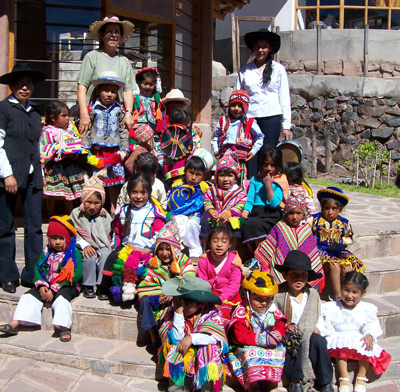
We support the work of social institutions: our Superfood-products are being packed by "Erlenhof Werkstatt für behinderte Menschen" and shipping is handled by "Stiftung Solvita".
WE PAY FAIR
We support small family farms and pay fair prices:
Through direct purchasing from Peruvian producers we make sure that our money goes directly to small family farms, providing them with livelihood
A partnership-based and long lasting relationship with our producers is important to us
- We see our selected suppliers as partners
- The foundation for success in a long lasting partnership is mutual trust, respect and openness – according these principles we act
Our goal is to support developing South American countries, such as Peru, by importing health benefiting products that are hundreds of years old and by distributing these products throughout Europe.
According to the motto “less is more“ we want to focus on a reasonable selection of products from South America.
About us:
We are a family company residing in Switzerland.
The idea for an online shop came after a visit to Chile, Bolivia and Peru, where the founders noticed the diversity of traditional and natural foods. These make it possible for the local people to have a balanced diet despite living in poverty.
A few of the very diverse vegan “superfood“ products that are available in South America were brought back from the journey and made into smoothies, mueslis, and many other delicious recipes and were then tried by the family: The result convinced us to put our ideas into practice and to build our own online shop.
Our Team:
Maria:
Is a passionate collector of recipes and loves healthy products. As a mother she feels very strongly about the importance of nutritional and natural food.
She has studied history and journalism at the FU Berlin and worked as an editor. She is responsible for communications, our blog, social media and the creation of recipes.

Cord:
Loves South America and traveling. He spent 2 years in Chile and is very familiar with South American culture. Through a number of trips through South America, and in conversation with indigenous peoples, he has discovered and learned to value many products.
As an experienced manager in the food industry, he is responsible for purchasing and all commercial activities.

Our Logo:
We have decided on a llama for our logo, as it is commonly found in the western part of South America.
For us it represents a being that lives in extreme climate conditions (high elevation and temperature fluctuations) that is very adaptable and able to survive its meager environment through nutritious and rich foods.
Due to archaeological findings it is known that the llama was domesticated over 5,000 years ago and was used for a variety of purposes. They functioned primarily as beasts of burden, as they are surefooted even at great elevation and on steep paths. Their wool provided the natives with warm clothing, and their dung was used as fuel for fires.
Under the rule of the Incas the llama received an even more important status: it helped to transport goods to inaccessible parts of the huge realm.
After the Spanish conquest the llama lost its meaning and was slowly replaced by horses and sheep.
